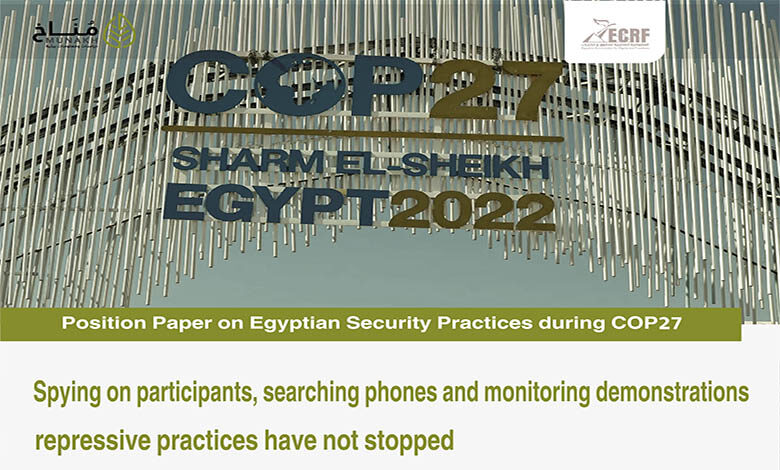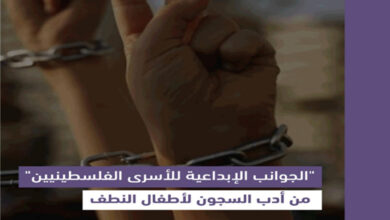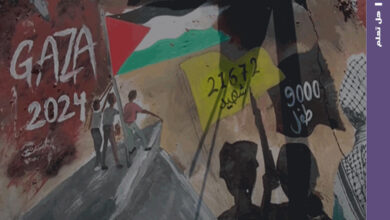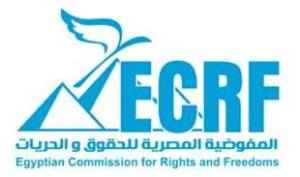“Spying on participants, searching phones and monitoring demonstrations, repressive practices have not stopped”
Position Paper on Egyptian Security Practices during COP27

Introduction
Frequent violations committed by Egyptian security authorities and individuals affiliated with various government institutions during the activities of the COP27 climate conference held in Sharm El-Sheikh, according to a number of activists and participants in those events: violations varied between violations of the immunity of the UN-administered area, violations of the sanctity of the private life of some conference participants, and attempts at surveillance, which were revealed upon the recklessness of a member of the Egyptian House of Representatives after he published on his personal page pictures of private conversations between activists and human rights and environmental groups that were snooped on without the knowledge of their owners, as well as the attack on personal freedom by stopping a member of the Belgian Parliament and searching her by Egyptian security. Moreover, the right to assembly was restricted by asking participants in the area designated for demonstrations to fulfill the notification requirement, in violation of the law.
The paper relied mainly on narratives by conference participants of the various nationalities to document the violations, where interviews were conducted through secure electronic platforms with four participants who refused to mention their names, for fear of security prosecutions during their stay in Egypt or being subjected to security prosecutions upon their return to their country. The paper also reviews several news and videos published on news sites on social media for the purpose of documenting violations by the Egyptian authorities.
The paper highlights the violation of those practices committed during the conference with international law, the Constitution and Egyptian law, and recommends an immediate investigation and accountability of the Egyptian authorities regarding breaches and human rights violations during the period under review.
1- The presence of Egyptian security inside the Blue Zone administered by the United Nations:
The Blue Zone, the UN-managed space where negotiations are hosted, is the competent authority to issue access to all attendees by the UNFCCC secretariat. This area is subject to comprehensive protection in accordance with international law, as recognized by the Vienna Convention on Diplomatic Relations of 1961, in force in Egypt as of November 25, 1964,[1] where it enjoys diplomatic immunity. [2] It imposes on the Egyptian authorities two basic obligations, the first of which is that these authorities refrain from entering the headquarters of the mission without the explicit permission of its president, and that members of the executive authority are prohibited from entering that area, unless expressly authorized by its president.[3]
“Security was strongly present in the Blue Zone, of both sexes, in identical uniform, and in the event of any gathering between the participants within the perimeter of that zone, security will wrap around this gathering and take pictures of people by phone”.
They were also present inside the halls, and during Sanaa Seif’s intervention, it was noticed that all the people entering the hall were filmed, and filming was taking place inside the hall, and this happens significantly during the gathering of members of civil society.[4]
Despite the fact that this area is under the control of the United Nations, the intensive security deployment of the Egyptian executive authority has violated that area in violation of international law and the Egyptian constitution, especially during events and press conferences, which makes Egyptian activists fear for their safety from security prosecutions or detention after the end of the conference, as well as the fear of foreign activists that they will be subjected to security prosecutions upon their arrival in their country.
Here it is worth asking, Did the Egyptian authority obtain the approval of the head of the United Nations mission for the presence of members of the executive authority inside the Blue Zone which is under United Nations Protection? Or was the presence of members of the executive authority inside that area without the permission or approval of the head of the UN mission, which is a violation of international law and the Egyptian constitution?
2- Violation of the sanctity of private life and searching phones:
One of the incidents that were monitored during the conference was that a member of parliament filmed private conversations of an activist on his mobile phone while holding those conversations with a group of activists to organize a solidarity event. The photos published by the parliamentarian on his personal Facebook page show that the photos were taken from a person while sitting near or behind the activist without his knowledge or consent, and the parliamentarian deliberately published these photos, claiming that they were evidence of employment by foreign countries.
What the MP committed constitutes two criminal offenses included in the Egyptian Penal Code, which criminalizes assaulting the sanctity of private life in Article 309 bis thereof, punishable by imprisonment for a period not exceeding one year for some of the acts specified in the text, such as voyeurism, recording or transmitting conversations that took place in a private place or by telephone, or taking and transmitting a picture of a person in a place. Article 309 bis punishes broadcasts or facilitation of the broadcast of a recording or document obtained using one of these methods[5]. It is worth mentioning that the Code of Criminal Procedure considered these crimes to have no statute of limitations and the criminal case arising therefrom does not expire with the lapse of time. The Code of Criminal Procedure[6] also prohibits judicial officers from searching closed or sealed items and considered phones and computers to fall within the framework of that rule, as they are often password protected or contain correspondence for which the law assumes a barrier of privacy.[7]
From a constitutional point of view, the 2014 Constitution affirmed the sanctity of private life in Article 57 thereof and the obligation to maintain it and prohibit infringement on it, as well as the sanctity of postal, telegraph, and electronic correspondence, telephone conversations, and other means of communication, ensuring their confidentiality, and prohibiting their confiscation or access except by a reasoned judicial order and for a specific period. [8]
The Constitution also considers any attack on the sanctity of private life a crime that does not have a statute of limitations, and allows the injured party to institute criminal proceedings directly and that the State guarantee fair compensation to the person who was assaulted, and grants the right to the National Council for Human Rights to report any violation of these rights to the Public Prosecution, and to intervene in the civil lawsuit by joining the injured party at his request. [9]
3- Violation of the right to personal freedom:
Every person has the right to freedom and security of person. [10]
During the proceedings of the conference, it was observed that one of the participants, a member of the Belgian parliament, was stopped and searched by the Egyptian security and her passport photographed because she carried badges bearing pictures of Egyptian detainees; she was asked to hand over her bag and demanded that her bag to the United Nations security.
“I was inside the area of the conference, I was stopped by the Egyptian security, because I wore a number of badges and pins bearing the pictures of the Egyptian detainees “Hoda Abdel Moneim, Al-Baqer, Alaa Abdel Fattah and Al-Qassas” and I was searched, and the passport was requested and photographed, and the United Nations security took my bag, which contains a number of pins bearing the pictures of Egyptian detainees, and I wanted to distribute them to the participants, and after about half an hour, the United Nations Security e gave me back my bag and asked me not to distribute anything because of Egyptian security.” [11]
This constitutes an attack on personal freedom, which is a natural right, and one of the rights attached to the human person, which is inviolable, and which may not be violated[12], except in the case of flagrante delicto. No one may be arrested, searched, or restricted in any way except by a reasoned judicial order required by the investigation. This guarantee is enshrined in article 54 of the Constitution and specifically specified by the legislator in article 46 of the Code of Criminal Procedure. The judicial officer has no right to search except in cases where the accused may be legally arrested; the judicial officer, without permission from the Public Prosecution or the investigating authority, may not encroach on the personal freedom of individual people, except in the case of flagrante delicto. [13]
4- The area designated for protest and demonstration
The area designated for protests and demonstrations lied in the Green Zone, which is administered by the Egyptian government and is open to the registered public. It is a platform where the business community, youth, civil societies, indigenous peoples, academics, artists, and fashion communities from around the world can express themselves and make their voices heard.
On May 24, 2022, the Minister of Foreign Affairs stated that the Egyptian authorities allocated a facility adjacent to the Convention Center so that activists could organize protests and express their opinions.
Later, the official website of the COP 27 climate conference of the Egyptian authorities published the rules of conduct for the use of the area designated for climate performances and the organization of climate marches in Sharm El-Sheikh during the period from 6 to 18 November, which are as follows:
In the event of organizing a march/demonstration in the green area designated for climate performances and climate marches:
Participants planning to organize a climate protest/demonstration in the area designated for climate demonstrations are required to notify on Climate.demo@cop27.eg for the purpose of protesting/demonstration, date, organizer, and designated point of contact with a copy of the conference badge 36 hours before the planned activity. Opening hours in the designated area are from 10:00 to 17:00.
“No demonstrations or events took place inside the designated area for demonstrations, due to the procedures required to be followed; all demonstrations take place in the vicinity of the United Nations Blue Zone. For example, I participated in a demonstration, in the Blue Zone, on November 12, 2022, “Global Day of Action for Climate Justice”, but the Egyptian security kept taking pictures of us during the demonstration”[14]
The requirements by the Egyptian authorities to organize an event or demonstration in the designated area led to the reluctance of activists to demonstrate in that area, and not to follow the procedures that violate the law. Most of the events took place in the Blue Zone, except for one demonstration that took place inside the Green Zone on November 17, 2022, and the Egyptian security did not prevent it. Only a heavy security presence was observed, and the following are the most prominent responses to these measures:
Article 73 of the Constitution establishes the right to demonstrate and express an opinion[15], and all forms of peaceful protests is a legitimate right, and the Constitution empowers the legislator to regulate notification of the exercise of this right accordingly. In accordance with Law No. 107 of 2013 on the regulation of the right to demonstrate, the legislator specified two ways to organize an event or demonstration. The first, in accordance with the text of Article 8 thereof[16], the notification is to inform the administration of the intention of the notifier. The legislator specified the party that receives the notification in the police department or station in whose department the place of the public meeting or the place of the start of the procession or demonstration is located, and it is also required to complete the notification before the start of the public meeting or procession or the demonstration by at least three working days and a maximum of fifteen days. The notification includes the place of the general meeting or the place and itinerary of the procession or demonstration, the start and end time, the subject of the general meeting, procession or demonstration, its purpose, and the demands and slogans raised by its participants, in addition to the names of individuals or the organizer of the general meeting, procession or demonstration, their characteristics, place of residence, and means of communication with them.
The second procedure, which is governed by Article 15 of the law[17], obliges the competent governor to identify a large enough area sufficient within the governorate for demonstrations, and that they be peaceful, without being bound by the notification.
Our responses to the procedures required by the Egyptian authorities to organize a demonstration in the designated area are as follows:
First: – The principle of legal texts is not to execute them against their intentions, and not to interpret their phrases in a way that deprives them of their meaning, separates them from their context, or is considered a distortion of them. If it is true that the text of Article 15 of the Demonstration Law intended that demonstrations in the designated area should be permitted without notice, it only stipulated that the demonstration should be peaceful, however, by referring to the requirements to demonstrate in the designated area, they included the description of the purpose of the protest/demonstration, the date, the organizer, and the designated point of communication with a copy of the conference badge, which has not been dictated by any text. . This is supported by the extrapolation of several decisions issued by governors to designate areas for demonstrations without requiring notification and without specifying the purpose of the demonstration. [18]
Second: – The principle of the legal text is to enforce it in its generality unless there is need for specification. If a generalization is restricted without evidence for the need to do so, this would be an unacceptable interpretation. In view of the above-mentioned procedures and their requirement for demonstrations in the designated area and the fact that the purpose of the demonstration must be exclusively related to environmental issues, we identify an additional condition not intended in the text, which only required abiding by the geographical area and a peaceful nature of the event, with no need for notification.
Third: – The text of Article 15 of the law has been explicit and unrestricted to the subject of demonstration or notification, and therefore it was logical for the legislator to undermine the designated area by stating the conditions, as specified in the text of Article 8 of the law that those who want to organize a public meeting or conduct a procession or demonstration must notify in accordance with certain provisions as mentioned earlier. This guarantees all those in Sharm el-Sheikh and entitles them to access to the Green Zone, the right to gathering, demonstrating, and expressing an opinion without adhering to the conditions and procedures listed on the official website of the COP27 climate conference in accordance with the law. The Egyptian authorities had no right to take a different position by preventing them from exercising this right by claiming that they do not follow the objective conditions and controls published on the official website of the climate conference.
Fourth: – The “area allocated” for demonstrations and organizing protests in Sharm El-Sheikh was determined without specifying whether a decision was issued by the Governor of South Sinai to allocate that area for demonstrations and protests in accordance with the law, which obligated the governor to determine an area designated for demonstration and protest. We only found the decision of the Governor of South Sinai No. 47 of 2017 regarding the determination of the safe boundaries for vital sites and public facilities within the scope of South Sinai Governorate. [19]
If a decision had been issued by the Governor of South Sinai to allocate that area for demonstrations, the required procedures would be a violation of the law. However, if this area had been allocated for demonstrations without a decision from the governor, these measures would then be a circumvention of the Egyptian law and constitution.
Position of the Egyptian Commission for Rights and Freedoms (ECRF):
ECRF believes that despite attempts by Egyptian authorities to exploit the climate conference to improve its image before the international community with regard to the human rights record in Egypt, violations it committed against conference participants are only a miniature example of the human rights situation in Egypt. Since 2014 Egypt has witnessed severe restrictions on freedom of opinion and expression, freedom of assembly and association through several legal barriers and the enactment of an arsenal of repressive legislation that would curtail rights and freedoms and impede participation in civilian life, purportedly to combat terrorism and preserve the country’s national security. Egyptian authorities have targeted human rights defenders, activists and critics by illegally summoning them, interrogating them under duress, subjecting them to extrajudicial surveillance measures, and subjecting others to physical and moral threats[20], travel bans[21], arresting some of them, bringing charges against them related to the peaceful exercise of their human rights, including them on “terrorist lists”, subjecting them to unfair trials before exceptional courts[22] and unfair sentences against some of them. [23]
We call upon the Public Prosecutor to open an investigation into the incidents of forcing a number of conference participants to open and search their phones, and we also call on the National Council to submit a report to the Public Prosecution requesting the opening of an investigation into these incidents in accordance with the Egyptian Constitution. [24]
We recommend calling on the Egyptian authorities to ensure the effective participation of civil society, the immediate and unconditional release of prisoners of conscience, the pardon of sentenced of activists and human rights defenders, and to take concrete steps towards improving the human rights situation in Egypt.
[1] See the decision of the Minister of Foreign Affairs – No. 33 of 1964, on the publication of Vienna Relations Diplomacy Agreement signed at Vienna on April 18, 1961 and the Optional Protocol on the acquisition of nationality annexed thereto.
[2] See the text of Article 22 of the Vienna Convention on Diplomatic Relations
[3] Research entitled Immunities and Privileges of the Permanent Mission House and its Diplomatic Personnel, available via the following link
[4] Interview with one of the conference participants through secure communication sites, 15 November 2022
[5] Article 309 bis and article 309 bis (a) of the Law No. 58 of 1937 on the promulgation of the Penal Code.
[6] See the text of Article 15 of the Law – No. 150 of the year 1950 concerning Issuing the Code of Criminal Procedure.
[7] text Article 97 of Law No. 150 of 1950 Code of Criminal Procedure “The examining magistrate alone shall have access to the seized letters, correspondence and other papers, provided that this is done, if possible, in the presence of the accused and the holder or addressee thereof and shall record their observations thereon. If necessary, he may assign one of the members of the Public Prosecution to sort the aforementioned papers. He may, according to what appears from the examination, order the joinder of such papers in the case file or return them to the person who was in possession of them or to the addressee.
[8] Article 57 0f the 2014 Egyptian constitution
[9] Article 99 0f the 2014 Egyptian constitution
[10] First paragraph of article 9 of the ICCPR
[11] Video posted on Facebook, 17 November 2022, last visit 20 November 2022. Link
[12] Article 54 0f the 2014 Egyptian constitution
[13] Article 46 of Law No. 150 of 1950, the Code of Criminal Procedure: “In cases in which the accused may be legally arrested, the judicial police officer may search him. If the accused is a female, the search must be conducted by a female delegated by the judicial police officer.”
[14] An interview with a conference participant via secure social media platforms, the date of the interview is November 13, 2022
[15] Article 73 0f the 2014 Egyptian constitution
[16] See the text of Article 8 of Decree-Law No. 107 of 2013 regulating the right to demonstrate
[17] See the text of Article 15 of Decree-Law No. 107 of 2013 regulating the right to demonstrate.
[18] Cairo Governor Decree No. 13867 of 2013 regarding defining an area of 20 feddans on the southern side of Fustat Park as a space for public meetings, processions, or peaceful demonstrations for the peaceful expression of opinion. Refer to Assiut Governor Decision No. 46 of 2017 regarding defining an area of 8,000 square meters in the Garden of Faith in the West Assiut district, in which public meetings, processions, or peaceful demonstrations are permitted for the peaceful expression of opinion.
[19] See South Sinai Governor Decision No. 47 of 2017 regarding defining safe boundaries for vital sites and public facilities within the scope of South Sinai Governorate.
[20] A statement issued by the Arabic Network for Human Rights Information, entitled “In light of the absence of the minimum rule of law and respect for human rights, the Arabic Network for Human Rights Information decides to suspend its activities,” last visit November 16, 2022, available via the following link
[21] Campaign entitled “Human Rights Defenders Banned from Traveling” Cairo Institute for Human Rights Studies on November 13, 2019, visit date: November 16, 2022, available via the following link





